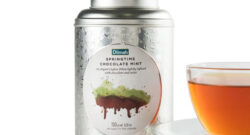Author: Shehani
The Gift of Tea: Timeless and Seasonal
It’s always the right season to share the gift of tea – even more so when it’s the finest and purest Ceylon tea. For, tea is a timeless gift. It calms and soothes on a hot summer day, and feels like a warm glow in the cool winter. Hence, whether you’re in the tropics, the wintery northern hemisphere, or the summery southern hemisphere during Christmas season, tea is always a great gifting option for family, colleagues, and friends. The tradition of gift-giving dates back to the very first Christmas – the birth of Christ itself. As history records it, the newborn Jesus is visited by three Wise Men (or Magi) from the east, bearing gifts of frankincense, myrrh, and gold. Fast forward to the 3rd Century AD, and St. Nicholas – better known as Santa Claus – reinstated and rerouted this practice by secretly leaving gifts for the needy every Christmas. This act of kindness set the precedent for sharing gifts at Christmas time – a tradition that continues to be followed with much love, to date. Coming back to the idea of gifting tea at Christmas, Dilmah Ceylon Tea makes seasonal gift-giving a breeze with their collection of Christmas Teas that come in the merriest of packaging. These packs comprise of different assortments of flavoured Dilmah teas, thoughtfully selected to harmonise with the moods and aromas of the Christmas season. There’s something to suit everyone, from fun Christmas Tea Advent Calendars (with 24 teas each), to a rather picturesque Christmas Tea Selection box with 10×4 varieties of tea bags, a tin caddy Holiday Tea Selection gift pack of 6×6 luxury leaf gourmet tea bags, a Natural Winter Infusions gift pack of 10×8 varieties of herbal infusions, eye-catching Christmas Tales packs with three loose leaf options – Dilmah Rose with French Vanilla Black Tea, Dilmah Ceylon Cinnamon Spice Black Tea, and Dilmah Lychee with Rose & Almond Black Tea, and so much more. Of course, there’s our favourite flavour for the season, too – Dilmah t-Series VSRT (Very Special Rare Tea) Rose, Marzipan & Mint Black Tea, in the trademark t-Series tin caddy. If you’re in Colombo, pop into your nearest t-Lounge by Dilmah outlet or Dilmah Tea Shop to tick a few names off your Christmas gift shopping list. If you’re elsewhere in the world, visit our online shop to make your picks for the season.
“That’s Refreshing”
About a year ago, Dilmah released an advert that subtly but aptly oozed freshness and zest. The tagline, “That’s refreshing,” resounded through the simple melody and vibrant visuals. Dilmah was introducing their Iced Tea range to the Sri Lankan consumer. It was a truly tropical mix of Black Tea with Mixed Berry, Black Tea with Mango, Black Tea with Peach, and Green Tea with Lychee, in eye-catching, convenient packaging that could begin to quench one’s thirst just at first sight. However, what makes Dilmah Iced Tea unique is not the catchy adverts or the vibrant packaging that sell it. What makes Dilmah Iced Tea stand a head above the rest is the product itself – the fact that it is made from fresh, hand-picked, single origin Ceylon tea. Just like every other Dilmah Ceylon Tea that you come across. There are no artificial ingredients, no “iced tea” concocted from artificially-sweetened powders, no mass production. The same amount of care that goes into crafting Dilmah’s exclusive ranges such as 85 Reserve, Tea Maker’s Private Reserve, and beyond, is put into crafting the Dilmah Iced Tea range as well. While being a ready-to-drink beverage that is available to be picked off a supermarket shelf, Dilmah Iced Tea still maintains the goodness and authenticity that Dilmah Founder Merrill J. Fernando promised to his consumers. The iced teas are naturally flavoured, with no artificial colours, sweeteners or preservatives. As a result, they retain their freshness in taste, while also ensuring that what goes into the consumer’s body is safe and accounted for – satisfaction guaranteed on more than one level! Now, that’s refreshing. What’s even better is that Dilmah Iced Tea is not limited for the enjoyment of consumers in Sri Lanka alone. It is available (in bottle/can packaging) for the global Dilmah Family to enjoy at a long list of international destinations that include Argentina, Armenia, Australia (check out their fun advert, too!), Canada, Chile, Georgia, Greece, Hungary, Morocco, Netherlands, New Zealand, Poland, Singapore, South Korea, Sweden, UK, USA, and Vietnam. So, what are you waiting for? Do try it!
Aging Gracefully with Camellia
Ah, but to age gracefully… Isn’t that something we all would love? Not just in terms of appearance, but holistically. Unfortunately, this process is not always entirely within our control. Genetics, ethnicity, environment, and a whole lot of other factors contribute towards our biological aging process. However, there are a few things that we can consider and put into practice, to slow down the aging process. Multiple global analyses carried out in recent years have brought researchers to the conclusion that regular consumption of tea, Camellia sinensis, can indeed slow down biological aging. ‘Regular’ implies 2-3 cups (6-8g) of black, green, or oolong tea per day. Even if one hasn’t previously been a regular tea-drinker, taking up the habit later on in life can still initiate a deceleration of the biological aging process. This phenomenon has been closely studied and shared by Dr. Benjamin Parmenter of the Nutrition and Health Innovation Research Institute at Edith Cowen University. As per Dr. Parmenter’s research into numerous scientific studies, the principal reason behind this is believed to be the high polyphenol content of tea. Polyphenols are involved in countering oxidative stress and the inflammation response, as well as in regulating gut bacteria. This latter factor plays a role in moderating changes that occur in metabolism, immunity and cognitive function with age. The regulation of these aspects is in turn mirrored in the biological aging process, which consequently takes place at a slower rate. Frailty, too, is a significant component of aging, and is believed to be associated with a reduced presence of antioxidants. Research suggests that being rich in antioxidants, and thereby eliciting anti-oxidative and anti-inflammatory properties, tea can significantly lower the risk of frailty in old age. This means that the risk of common age-related issues, such as hip fractures, would also consequently be lowered. In addition to this, the combination of L-theanine and caffeine, which is unique to tea, synergistically promotes alertness and relaxation, thereby improving and supporting cognitive performance. Polyphenols and caffeine are also believed to play a role in reducing neurological degeneration and amyloid plaque formation in the brain, thereby potentially having a protective effect against dementia and Alzheimer’s disease. Taking all these into consideration, it certainly seems that having Camellia sinensis as a lifelong friend might be a great way to retain your youth for a longer time!
Much to Buzz About at the t-Bears Academy
Coming up with activities that are of interest and value to kids can be challenging. This is particularly true during – but not limited to – school breaks. While weekends and holidays can be a great time for more parent-child interaction, and not having to stress over schedules and deadlines, it also does pose the challenge of coming up with ideas to keep your kids occupied and expending their energy in worthwhile ways. This is where the t-Bears Academy steps in. If you’ve visited t-Lounge by Dilmah at Horton Place in Colombo after its recent revamp, you might have seen the t-Bears Academy Activity Space – a dedicated space for conducting fun, educational and engaging activities for kids. During the school summer break of 2025, the academy conducted eight such workshops over a span of three weeks. What’s special about these, is that there is something for everyone – regardless of interest and age. This summer’s workshop themes were: The great news is that these exciting t-Bears Academy workshops are not limited to the summer holidays – they happen during school term weekends, too! If you follow @teatimerocks on Instagram, you can easily keep tabs on what’s on and when, so that your kids, grandkids, nieces, nephews, and even friends’ kids don’t miss out on any of the fun. Often, t-Bears Academy Club members in Sri Lanka get to enjoy special discounts and priority enrolment at these workshops, and there are occasional activities that are exclusively open to club members. So, it would indeed be prudent to register your kids at the academy to make the most of these offers and fun engagements. DM t-Lounge by Dilmah to find out how your kids can get on board, so that both they and you have something to look forward to!
Chocolate and Mint, Anyone?
We all know that mint goes very well with chocolate – particularly dark chocolate. We also know that mint goes well with tea. As always, Dilmah has done the exceptional deed of putting them all together in the form of Vivid Springtime Chocolate Mint, which infuses dark chocolate and mint with the elegant Nawalapitiya Region Ceylon Pekoe tea. With such an exotic combo, we thought it fitting to share three beverage recipes that you could try your hand at, using Dilmah Vivid Springtime Chocolate Mint tea. RECIPE 1: The Duke of Chocolate Smoothie (tea-inspired smoothie) We think this would be such a winner at kiddie parties. However, there’s nothing that should stop adults (who are kids at heart) from indulging, too! What you need: How to prepare: RECIPE 2: Umpa Lumpa (tea inspired-mocktail) This could easily add a touch of sparkle to an afternoon catch-up with friends. Equally easily convertible to a tea inspired-cocktail with a dash of white rum, we say! What you need: How to prepare: RECIPE 3: After 3 (tea-inspired mocktail) With a look of sophistication, we think this would be great to sip on at a sit-down or cocktail evening gathering. Add a touch of brandy or port wine to spruce it up into a tea-inspired cocktail. What you need: How to prepare: Have you tried any of these recipes with Dilmah Vivid Springtime Chocolate Mint Tea? If so, do let us know in the comments, or post your culinary adventures on your socials and tag us @dilmahceylontea.
Mr. Dilmah – The Face and Voice of His Beloved Brand
Merrill J. Fernando was a man who held his ground when it came to marketing his beloved Dilmah. Fondly referred to as MJF, his confidence was built on a foundation of instinct and experience that no theoretical marketing strategies could parallel. He was a steadfast believer in the goodness of pure Ceylon tea, in his ability as a teamaker, and in his God. There was nothing that could make him waver in his allegiance to any of these. This narration makes more sense if we go back to where it all started – his ordinary childhood in the humble fishing village of Pallansena in Negombo, Sri Lanka. MJF was a gentleman who, despite all the international accolades accrued in his lifetime, always appreciated and reminisced the simplicity of his early village life. Chapter 23 of his memoir, The Story of Ceylon Teamaker Merrill J. Fernando, opens with a reference to the personal connection that the owner of a neighbourhood grocery shop often made with their customers, back in the day. They owned the shop, ran the shop, knew the consumer, and knew every product they sold. They could offer insight or advice, if required, on any product, and thereby had a sense of accountability for what they sold. MJF’s marketing strategy was based on the same simple, straightforward, interactive approach. It was personal marketing. At a time when authentic, artisanal, consumer-centric products were gradually being replaced by commercially-driven mass production, MJF stayed true to his promise of making the world a better tea – garden-fresh, unblended, single origin, pure Ceylon tea. As the founder and owner of his Dilmah brand, he personally visited the countries to which Dilmah tea was exported, guaranteeing the producer’s accountability to both buyer and consumer. The unprecedented move gave him an unparalleled advantage over other brands that relied on middle-men to promote their products, for MJF knew his product inside-out. He could answer any question about it. He talked with and listened to his consumer, first-hand. He wasn’t simply selling Dilmah tea – he created it, nurtured it, loved it, and lived it. Unlike other faceless, emotionless multinational competitors, MJF’s personal involvement in introducing and promoting his Dilmah to foreign markets made it a peerless product that came with this real man, in flesh and blood, whom consumers could see, hear, and relate to. Above all, family values stood at the core of this marketing platform. It is no surprise, therefore, that so many of the people he met on a business level in the early years of Dilmah, evolved into lifelong friends. With a little coaxing from his friend and agent Daron Curtiss in New Zealand, MJF agreed to be the face and voice of his own brand – on television, radio, and in magazines. He was soon recognised in New Zealand – and subsequently around the world – as ‘Mr. Dilmah’, and his iconic words, “Do Try It” have echoed across the globe and through generations of tea drinkers. The trials and tribulations that MJF faced in his quest to make the world a better tea are numerous. It took him nearly four decades to fulfil his aspiration of creating his beloved Dilmah, having to work his way through both colonial and local bureaucracy. The international market proved to be equally prickly, with some competitors and retailers resorting to vile manipulation. Yet, MJF persevered and persisted, refusing to disrespect the Ceylon tea that he revered, or degrade the Dilmah brand that he had dedicated his life to. Akin to his faith in God was his belief that his ethos would one day be rewarded. As he says in his memoir, “If the product is genuine, the consumer will ensure the success of the brand.” Words to live by, indeed.
Dilmah and Seven Network Shatter Records Down Under
Sri Lanka is on the bucket list of many-a-traveller. A fair amount of enthusiasm and excitement from viewers would therefore have been expected when Australia’s Seven Network launched a competition to win a trip to Sri Lanka, in conjunction with Dilmah Ceylon Tea. However, a response of nearly 60,000 entries was completely unexpected – and unprecedented! It, in fact, broke television records in Australia, for the highest number of entries received for a competition of this sort. Dream Escape, as the competition was aptly titled, allowed 20 lucky participants the opportunity to win a five-night stay for two in Sri Lanka. Return tickets to Colombo from Sydney were sponsored by SriLankan Airlines, Sri Lanka’s national carrier, known for its warmth and hospitality. The first two nights of the trip were to be spent in Colombo, enjoying the sights, sounds and vibrance of the country’s capital city. Winners then had the opportunity to choose from three exclusive luxury properties managed by Resplendent Ceylon, the competition’s hospitality partner and luxury hospitality arm of Dilmah Tea, for the next three nights. They could spend this time up in the chilly tea country at a colonial-style Ceylon Tea Trails bungalow, or at the exotic Cape Weligama resort in the south, or at the uber-cool Wild Coast Tented Lodge property that lies between jungle and ocean in Yala. The competition was prompted by Dilmah’s desire to celebrate 40 years of Dilmah Ceylon Tea in Australia. In true Dilmah style – inspired by our beloved late Founder Merrill J. Fernando – celebrating anything grand involves giving back on a grander scale. Thus, the idea to treat 20 winners from Dilmah’s first international market to a trip around the beautiful island from which Dilmah takes the purest of Ceylon tea to the world. After all, Dilmah tea has been a top favourite for decades among tea consumers in Australia. The competition was open to all of Seven Network’s ‘Sunrise’, ‘Weekend Sunrise’, and ‘The Morning Show’ Australian viewers. With a total jackpot of AUD 260,000, each winner’s trip was worth a breezy AUD 13,000. All it took to stand a chance to win this luxurious getaway was an entry stating, in up to 25 words, why you would love to visit Sri Lanka – the home of Dilmah tea, and how you enjoy your perfect cuppa. We wish all the lucky winners of this competition a truly memorable time during their luxurious Dream Escape to our beautiful island!








